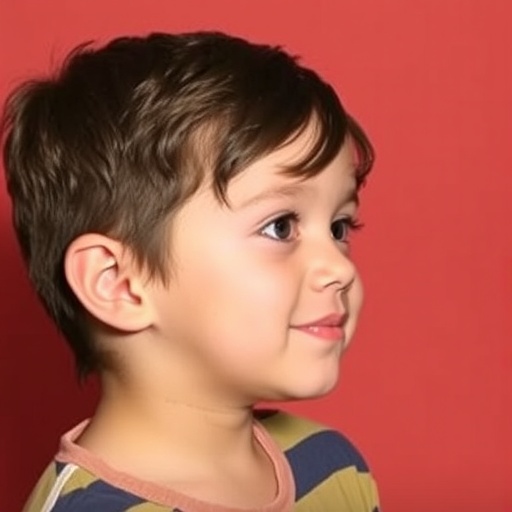Recent research published sheds new light on the neural mechanisms underlying auditory processing in adults with Autism Spectrum Conditions (ASC). This groundbreaking study, led by Liu, delves into the intricate workings of attention-dependent and pre-attentive neural markers, revealing distinct differences between individuals with typical developmental trajectories and those on the autism spectrum. A deeper understanding of these neural markers not only informs the scientific community of the auditory processing abnormalities prevalent among adults with ASC but also holds implications for therapeutic approaches tailored to enhance communication and interpretation of sensory information in this population.
The auditory change process is vital for recognizing and responding to stimuli in our environment, from understanding spoken language to enjoying music. Neuroimaging techniques have made it possible to investigate the brain’s response to auditory changes, thereby elucidating the mechanisms by which these changes are perceived and processed. In typical development, these neural responses fluctuate based on what the individual is paying attention to, a process known as attention-dependent processing. Conversely, the study suggests that, for adults with ASC, this processing might be atypical, leading to challenges in recognizing auditory cues that are critical for effective communication.
One of the key findings of Liu’s research is that while the attention-dependent neural markers show difference, the pre-attentive processing mechanisms, which operate automatically and without conscious effort, do not exhibit the same abnormalities. This distinction raises crucial questions about the nature of auditory attention in ASC and where precisely the processing bottlenecks occur. Understanding these factors could provide a more comprehensive picture of how individuals with autism interact with their auditory environment and why they may struggle with certain auditory tasks.
The study employed advanced neuroimaging techniques to measure the brain’s electrical activity in response to auditory stimuli. By comparing the neural responses of adults with ASC to those of neurotypical individuals, the researchers were able to identify specific patterns that suggest weakened attention-dependent processing in the context of auditory changes. The researchers observed that in individuals with ASC, the brain did not allocate attentional resources effectively when required to focus on certain auditory signals amid competing background noise.
Moreover, the implications of this research extend beyond the laboratory setting. Understanding how attention influences auditory processing could shape interventions aimed at improving social communication skills for adults with ASC. Speech and language therapy could, for instance, be adapted to focus on enhancing attention and auditory discrimination, thereby capitalizing on individuals’ strengths in other cognitive domains. Such a tailored approach would acknowledge the unique auditory challenges posed by ASC while fostering improved interaction and engagement in real-world environments.
Another significant point raised in this study is the need to redefine our understanding of sensory processing in autism. While much of the previous research has often focused on visual processing, this study emphasizes that auditory processing deserves equal attention, particularly as listening skills are integral to social cognition and emotional understanding. By redirecting the spotlight onto auditory processing, researchers can develop a more holistic view of individuals with ASC, paving the way for more nuanced support systems.
The findings of Liu’s research also prompt a re-evaluation of how we measure success in therapeutic interventions for adults on the autism spectrum. Traditionally, clinical assessments have relied on behavioral outcomes without accounting for the underlying neurological processes. By integrating neurophysiological metrics into therapeutic assessments, practitioners may ascertain more comprehensive and individualized treatment strategies that account for each person’s specific auditory processing needs.
Additionally, the research hints at potential avenues for interventions that could harness technology to aid auditory processing. For instance, wearable devices equipped with auditory enhancements tailored to individuals with ASC could potentially improve real-time auditory discrimination in crowded or noisy environments. These innovations could revolutionize daily life for individuals on the spectrum by ensuring that essential auditory information is not lost amidst background noise, fostering greater independence and improving quality of life.
The study also invites further scrutiny into the environmental and genetic factors that might contribute to atypical auditory processing. Furthermore, it raises the need for additional studies to explore these findings across different age groups and levels of functioning, thus ensuring a richer understanding of the spectrum of auditory processing characteristics within the autism community.
In conclusion, Liu’s exploration of auditory change processes in individuals with Autism Spectrum Conditions signifies a pivotal moment in understanding the neurological basis of auditory processing atypicalities. As we move forward, it is crucial for the scientific community to collaborate and push boundaries in researching the multifaceted aspects of autism. By adopting a comprehensive, multi-disciplinary approach toward exploring such sensory processes, we can develop better therapeutic strategies and amplify the voices of individuals on the spectrum, allowing them to thrive in a sound-centered world.
As this influential research continues to foster discussion and exploration within the field of autism studies, it underscores the importance of recognizing that auditory processing is not just a function of hearing, but an intricate cognitive skill that plays a pivotal role in the social fabric of daily life.
With the continued focus on understanding the complexities of neurological functioning in ASC through studies like Liu’s, we stand on the precipice of not just expanding our knowledge but also enhancing the quality of care and support provided to those affected. This research exemplifies the essential synergy between scientific inquiry and practical application, illustrating how understanding brain mechanisms can ultimately lead to transformative changes in the lives of individuals on the autism spectrum.
Subject of Research: Auditory processing in adults with Autism Spectrum Conditions.
Article Title: Attention-Dependent but not Pre-attentive Neural Markers of Auditory Change Process are Atypical in Adults With Autism Spectrum Conditions.
Article References:
Liu, P. Attention-Dependent but not Pre-attentive Neural Markers of Auditory Change Process are Atypical in Adults With Autism Spectrum Conditions.
J Autism Dev Disord (2025). https://doi.org/10.1007/s10803-025-07096-0
Image Credits: AI Generated
DOI:
Keywords: Auditory processing, Autism Spectrum Conditions, Attention-dependent processing, Neuroimaging, Sensory integration.




